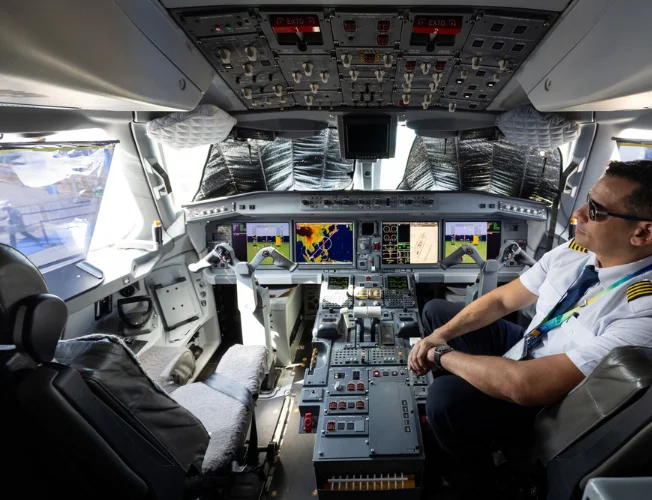The aviation industry, facing mounting pressure to reduce its environmental footprint, is exploring innovative solutions to become a more sustainable mode of transport. One exciting development comes in the form of new economy-class seats from German manufacturer Recaro Aircraft Seating GmbH, crafted with surprising materials: cactus skin and recycled fishing nets.
A Seat with Sustainability in Mind
This eco-friendly seat boasts several noteworthy features
- Recycled Foam: The seat padding utilizes recycled foam sourced from old mattresses, giving discarded materials a second life.
- Wood and Cork Armrests: Sustainable alternatives to traditional plastics, these armrests offer a comfortable and eco-conscious touch.
- Fish Netting Mesh Pockets: Discarded fishing nets, often posing a threat to marine life, are woven into the seat back pockets, promoting responsible waste management.
Commercial Availability and Certification
Recaro CEO Mark Hiller, interviewed at the Singapore Airshow, anticipates commercial availability of the seat this year, with first deliveries expected by 2025 at the latest. While some components still require certification, the timeline suggests airlines could soon offer passengers a more sustainable flying experience.
Airlines Aiming for Carbon Neutrality
Driven by growing government pressure and environmental concerns, airlines are actively pursuing carbon neutrality goals by 2050. Sustainable plane seats, like Recaro’s innovative design, offer a tangible way for airlines to showcase their commitment to green initiatives and contribute to a more sustainable future for air travel.
Cactus Skin: A Sustainable Alternative
The use of cactus skin in the seat design is particularly interesting. This unique material offers several advantages:
- Eco-friendly: Cactus cultivation requires minimal water and thrives in arid regions, making it a sustainable choice compared to resource-intensive materials like leather.
- Lightweight: To avoid adding unnecessary weight to the aircraft and impacting fuel consumption, the seat needed to be lightweight. Cactus skin’s natural properties make it a suitable material for this purpose.
- Durable: Cactus skin is known for its durability and resistance to wear and tear, ensuring the seat can withstand the demands of airline operations.
Looking Ahead: A Greener Future for Air Travel
Recaro’s sustainable seat design represents a significant step forward for the aviation industry. As airlines strive to meet their ambitious environmental goals, we can expect to see more innovative and eco-conscious solutions emerge. From utilizing recycled materials to exploring alternative fuels, the future of air travel is increasingly focused on sustainability, and passengers may soon find themselves flying in cabins that reflect this commitment to a greener future.
Read more.. Marketing News, Advertising News, PR and Finance News, Digital News.





